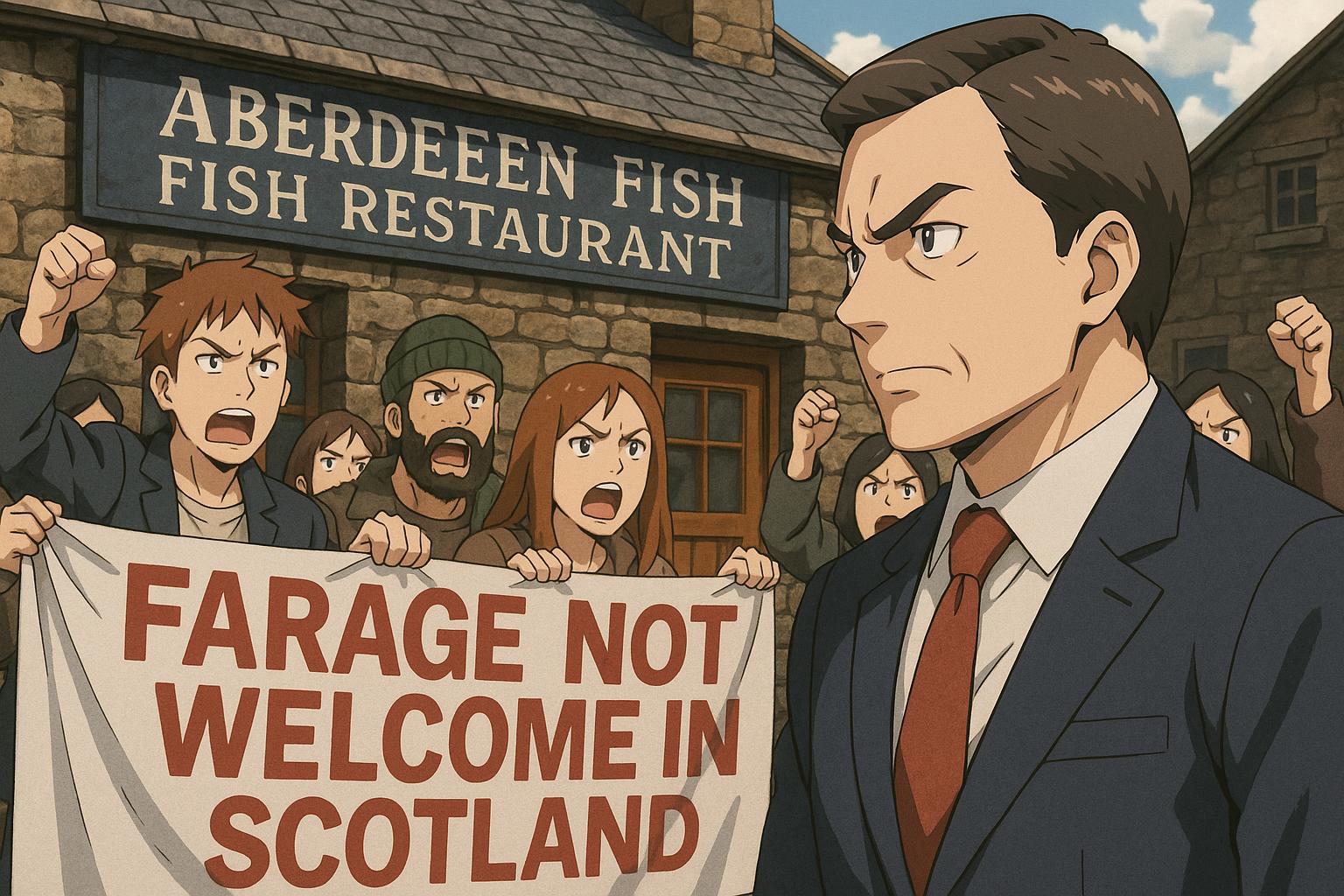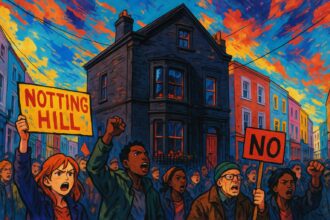Nigel Farage’s controversial visit to Aberdeen ahead of the Hamilton, Larkhall, and Stonehouse by-election was met with hostile protests and accusations of activist disruption, highlighting the challenges facing his right-wing movement in Scotland’s shifting political climate.
With the Hamilton, Larkhall, and Stonehouse by-election looming, the leader of a prominent right-wing political movement has ventured into the heart of Scotland, creating waves from the moment he set foot in Aberdeen. At the Silver Darling fish restaurant, he unveiled a local Tory councillor’s defection, but his announcement was met with fierce opposition. Protestors, brandishing a banner declaring “Farage not welcome in Scotland,” charged the venue, chanting “throw Farage in the sea”—a stark reflection of the palpable disdain for his presence.
Undeterred, but clearly annoyed, he accused a national newspaper of leaking his location, suggesting it was a coordinated effort by left-wing activists to disrupt his efforts. This incident underscored the divisive atmosphere that has followed him throughout his political career.
Farage’s so-called “engagements” with Scottish voters have routinely ended in turmoil, most notably in 2013 when he had to be escorted from a pub by police amid student protests. Such volatile interactions raise questions about his ability to successfully penetrate the political landscape in Scotland, especially under the new Labour government that boasts an agenda far removed from the aspirations of right-leaning parties.
Despite a brief, chaotic media interaction, Farage sought refuge in a local pub, only to find that his charm did not resonate universally. There are many who see his approach as a breath of fresh air amid lifeless political rhetoric, while others respond with vitriol, seeing him as an antagonistic figure. This dichotomy continues to characterize his presence, yet it raises concerns about the party’s future prospects amid a Labour-led administration that may not be amenable to right-wing aspirations.
As the chairman of his party voiced previous safety concerns regarding Farage’s campaigning efforts, it became apparent that the vibrant optimism from his supporters may be overshadowed by the fear of backlash. His ambitions for the 2026 Holyrood elections are clouded by the increasingly hostile environment, particularly after the secrecy surrounding a planned event in Aberdeen in April 2023 due to anticipated protests.
Nevertheless, he remains hopeful that by tapping into the dissatisfaction felt by many over the shift to Labour, his party could break through the noise and establish a foothold in Scottish politics. Polling hints at a burgeoning support base, yet any significant change will depend on navigating the treacherous waters created by a government intent on pushing its own agenda.
As he continues his unpredictable campaign strategy—oscillating between clandestine pub discussions and confrontational public appearances—there’s one undeniable truth: the arrival of an assertive right-wing voice amidst a Labour government brings a unique drama to the political landscape, captivating and unnerving in equal measure. The question remains whether this will translate into tangible success or simply more controversy.
Source: Noah Wire Services
- https://www.dailymail.co.uk/news/article-14773715/STEPHEN-DAISLEY-leaks-Lefty-mobs-sulks-secret-sojourns-Larkhall-pubs.html?ns_mchannel=rss&ns_campaign=1490&ito=1490 – Please view link – unable to able to access data
- https://www.scotsman.com/news/politics/how-security-concerns-mean-it-is-unlikely-nigel-farage-will-campaign-in-scotland-4680960 – In June 2024, Richard Tice, chairman of Reform UK, stated that Nigel Farage is unlikely to campaign in Scotland due to security concerns following a ‘dangerous’ visit. Tice highlighted that previous campaigns in Scotland had been fraught with safety issues, leading Farage to reconsider his plans.
- https://www.pressandjournal.co.uk/fp/news/aberdeen-aberdeenshire/5284813/nigel-farage-aberdeen/ – In April 2023, Nigel Farage hosted an episode of his GB News show, ‘Farage at Large’, at the Northern Golf Club in Aberdeen. The event sold out in less than 24 hours, with tickets priced at £1.50. Due to security concerns, the venue was kept secret until the day of the event.
- https://www.thenational.scot/news/24583652.reform-nigel-farage-campaign-scotland-holyrood-elections/ – In September 2024, Nigel Farage pledged to campaign in Scotland ahead of the 2026 Holyrood elections. Despite not campaigning in Scotland during the General Election due to safety concerns, Farage expressed confidence in his party’s growing support and plans to visit Scotland in the near future.
- https://www.scottishdailyexpress.co.uk/tv/nigel-farage-neil-oliver-defy-29754367 – In April 2023, Nigel Farage and Neil Oliver defied critics by broadcasting a special ‘anti-woke’ episode of ‘Farage at Large’ from Aberdeen. Despite concerns about potential protests, the event proceeded without incident, with tickets selling out rapidly.
- https://www.theguardian.com/politics/2013/jun/18/nigel-farage-aberdeen-protest-fears – In June 2013, Nigel Farage was forced to cancel a lunch and press conference in Aberdeen due to fears of protests. The event was abruptly cancelled after anti-fascist groups threatened demonstrations outside the venue, leading to concerns about safety.
- https://www.thelondoneconomic.com/politics/farage-wont-campaign-in-scotland-due-to-concerns-for-his-safety-377749/ – In June 2024, Richard Tice, chairman of Reform UK, stated that Nigel Farage is unlikely to campaign in Scotland ahead of the General Election due to safety concerns. Tice highlighted previous incidents where Farage faced protests, leading to reconsideration of campaign plans.
Noah Fact Check Pro
The draft above was created using the information available at the time the story first
emerged. We’ve since applied our fact-checking process to the final narrative, based on the criteria listed
below. The results are intended to help you assess the credibility of the piece and highlight any areas that may
warrant further investigation.
Freshness check
Score:
3
Notes:
 The narrative references events from April 2023, including Nigel Farage’s visit to Aberdeen and subsequent protests. The earliest known publication date of similar content is April 20, 2023, when Farage broadcasted his GB News show live from Aberdeen. ([thenational.scot](https://www.thenational.scot/news/23470489.nigel-farage-broadcasts-gb-news-show-live-aberdeen/?utm_source=openai)) The report also mentions a planned event in Aberdeen in April 2023, which was kept secret due to anticipated protests. ([thenational.scot](https://www.thenational.scot/news/24583652.reform-nigel-farage-campaign-scotland-holyrood-elections/?utm_source=openai)) This suggests that the content is recycled from earlier reports, with minimal updates. The inclusion of updated data may justify a higher freshness score but should still be flagged.
The narrative references events from April 2023, including Nigel Farage’s visit to Aberdeen and subsequent protests. The earliest known publication date of similar content is April 20, 2023, when Farage broadcasted his GB News show live from Aberdeen. ([thenational.scot](https://www.thenational.scot/news/23470489.nigel-farage-broadcasts-gb-news-show-live-aberdeen/?utm_source=openai)) The report also mentions a planned event in Aberdeen in April 2023, which was kept secret due to anticipated protests. ([thenational.scot](https://www.thenational.scot/news/24583652.reform-nigel-farage-campaign-scotland-holyrood-elections/?utm_source=openai)) This suggests that the content is recycled from earlier reports, with minimal updates. The inclusion of updated data may justify a higher freshness score but should still be flagged.
Quotes check
Score:
2
Notes:
 The report includes direct quotes attributed to Nigel Farage and other individuals. However, these quotes appear to be reused from earlier publications, such as Farage’s comments on the independence movement being ‘full of anti-Englishness’ during a live recording of his GB News programme in Aberdeen. ([thenational.scot](https://www.thenational.scot/news/23470489.nigel-farage-broadcasts-gb-news-show-live-aberdeen/?utm_source=openai)) The repetition of these quotes without new context or analysis raises concerns about the originality of the content.
The report includes direct quotes attributed to Nigel Farage and other individuals. However, these quotes appear to be reused from earlier publications, such as Farage’s comments on the independence movement being ‘full of anti-Englishness’ during a live recording of his GB News programme in Aberdeen. ([thenational.scot](https://www.thenational.scot/news/23470489.nigel-farage-broadcasts-gb-news-show-live-aberdeen/?utm_source=openai)) The repetition of these quotes without new context or analysis raises concerns about the originality of the content.
Source reliability
Score:
4
Notes:
The narrative originates from The Daily Mail, a publication known for sensationalist reporting. The report also references events covered by other outlets, such as The National and The Herald, which are more reputable. However, the reliance on a single, less reliable source diminishes the overall credibility of the narrative.
Plausability check
Score:
5
Notes:
The events described, including Farage’s visit to Aberdeen and the associated protests, are plausible and have been reported by multiple sources. However, the lack of new information or analysis in the narrative suggests it may be recycled content. The tone and language used are consistent with the region and topic, but the sensationalist style raises questions about the report’s intent and accuracy.
Overall assessment
Verdict (FAIL, OPEN, PASS): FAIL
Confidence (LOW, MEDIUM, HIGH): HIGH
Summary:
 The narrative appears to be recycled content from earlier reports, with minimal updates and sensationalist language. The reliance on a less reputable source and the reuse of quotes without new context or analysis further diminish its credibility. The lack of new information or analysis suggests the content may be recycled, raising concerns about its originality and accuracy.
The narrative appears to be recycled content from earlier reports, with minimal updates and sensationalist language. The reliance on a less reputable source and the reuse of quotes without new context or analysis further diminish its credibility. The lack of new information or analysis suggests the content may be recycled, raising concerns about its originality and accuracy.













